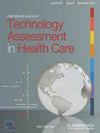OP153 Access To Real-World Data For Use In Health Technology Assessment – Still Work To Be Done
IF 2.6
4区 医学
Q2 HEALTH CARE SCIENCES & SERVICES
International Journal of Technology Assessment in Health Care
Pub Date : 2023-12-14
DOI:10.1017/s0266462323001526
引用次数: 0
Abstract
IntroductionReal-world data (RWD) is an important source of evidence for health technology assessment (HTA). It is widely used to fill clinical trial data gaps and to inform risk-sharing agreements. HTA is mandatory in many jurisdictions as it is used for price negotiation between a manufacturer and a payer. HTA practitioners have so far had limited involvement in the debate surrounding access to RWD as regulators have primarily focused on scientific research and market authorization. This study examined the challenges of obtaining RWD for HTA decision-making that is beneficial at the population level when data sources are restricted to maintain the data integrity and rights of the public.MethodsTypes of RWD and processes for obtaining data were assessed for two jurisdictions (Australia and Denmark). Types of data considered were national registries, ongoing or completed cohorts, surveys at various universities, archived historical data, and medical claims data. The assessment was performed by analyzing a series of cases.ResultsThere were similarities and differences between the two jurisdictions. In both jurisdictions the process for obtaining data included an ethics application as well as data handling fees. Patients and clinicians had little to no say in what their data are used for. It can take up to six months to obtain data. Person identification numbers enable linking of different datasets. Population wide data are accessible in Denmark only through secure servers, whereas full data sets, such as prescription data, can be released for research in Australia. Public hospital data, such as electronic health records, are not easily obtained in Denmark. In Australia, public hospitals are run by individual states and, therefore, additional effort is required to access nationwide data.ConclusionsAccess to RWD for HTA is challenging in both Australia and Denmark. Improvements in the process of applying for data and linking different data sources for HTA purposes are still needed.OP153 获取真实世界数据用于卫生技术评估--仍有工作要做
导言真实世界数据(RWD)是卫生技术评估(HTA)的重要证据来源。它被广泛用于填补临床试验数据缺口和为风险分担协议提供信息。HTA 在许多司法管辖区都是强制性的,因为它被用于制造商和支付方之间的价格谈判。迄今为止,由于监管机构主要关注科学研究和市场授权,因此 HTA 从业人员在围绕获取 RWD 的辩论中参与有限。本研究探讨了在数据来源受到限制以维护数据完整性和公众权利的情况下,为 HTA 决策获取有益于人口水平的 RWD 所面临的挑战。方法评估了两个司法管辖区(澳大利亚和丹麦)的 RWD 类型和获取数据的流程。所考虑的数据类型包括国家登记处、正在进行或已完成的队列、各大学的调查、存档的历史数据以及医疗索赔数据。评估是通过分析一系列病例进行的。在两个辖区,获取数据的过程都包括伦理申请和数据处理费用。患者和临床医生对其数据的用途几乎没有发言权。获取数据可能需要长达六个月的时间。通过个人识别码可以将不同的数据集联系起来。在丹麦,只有通过安全的服务器才能访问全人口数据,而在澳大利亚,处方数据等完整的数据集可用于研究。在丹麦,电子健康记录等公立医院数据不易获取。在澳大利亚,公立医院由各州管理,因此需要付出更多努力才能获取全国范围内的数据。澳大利亚和丹麦在为 HTA 获取 RWD 方面都面临挑战,仍需改进为 HTA 目的申请数据和连接不同数据源的流程。
本文章由计算机程序翻译,如有差异,请以英文原文为准。
求助全文
约1分钟内获得全文
求助全文
来源期刊

International Journal of Technology Assessment in Health Care
医学-公共卫生、环境卫生与职业卫生
CiteScore
4.40
自引率
15.60%
发文量
116
审稿时长
6-12 weeks
期刊介绍:
International Journal of Technology Assessment in Health Care serves as a forum for the wide range of health policy makers and professionals interested in the economic, social, ethical, medical and public health implications of health technology. It covers the development, evaluation, diffusion and use of health technology, as well as its impact on the organization and management of health care systems and public health. In addition to general essays and research reports, regular columns on technology assessment reports and thematic sections are published.
 求助内容:
求助内容: 应助结果提醒方式:
应助结果提醒方式:


